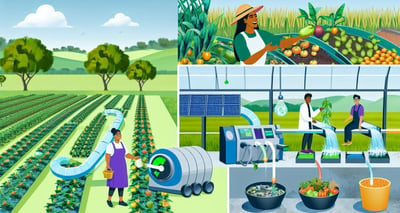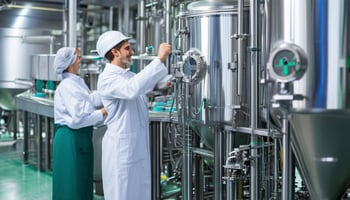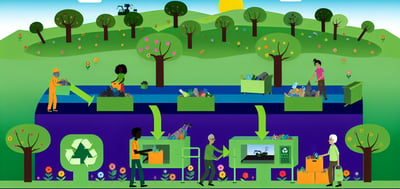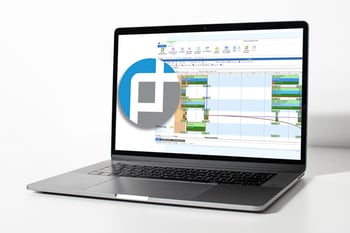Supply Chains through End-of-Life Product Recovery Systems
As environmental concerns escalate and consumer preferences evolve, supply chain managers are faced with the daunting task of not only ensuring efficiency and profitability but also integrating sustainable practices into every aspect of their operations. One area that holds immense potential for advancing sustainability goals is the implementation of end-of-life product recovery systems within the supply chain.
In this blog, we look into the significance of sustainable end-of-life product recovery systems for food and beverage supply chains, exploring their benefits, challenges, and the pivotal role of integration between advanced planning and enterprise resource planning systems like PlanetTogether and leading platforms such as SAP, Oracle, Microsoft, Kinaxis, and Aveva.

The Imperative of Sustainability in Food and Beverage Supply Chains
The food and beverage industry is under increasing pressure to address environmental concerns ranging from greenhouse gas emissions to waste management. As global populations swell and resources dwindle, the need for sustainable practices becomes ever more urgent. Supply chain managers are tasked with finding innovative solutions that not only optimize processes but also minimize environmental impact.
End-of-life product recovery systems offer a promising avenue for achieving these dual objectives. By implementing strategies for the collection, recycling, and repurposing of products at the end of their lifecycle, companies can reduce waste, conserve resources, and even create new revenue streams.

Understanding End-of-Life Product Recovery Systems
End-of-life product recovery systems encompass a range of strategies aimed at extending the lifespan of products and minimizing their environmental footprint once they reach the end of their intended use. These systems typically include processes such as:
Reverse Logistics: The process of collecting, transporting, and managing products or materials that have reached the end of their useful life.
Remanufacturing: The practice of disassembling used products, refurbishing them to a like-new condition, and reintroducing them into the market.
Recycling: The conversion of waste materials into reusable materials, thereby reducing the need for virgin resources and minimizing landfill waste.
Upcycling: Transforming waste materials into products of higher value or quality, often through creative design or innovative processes.

Benefits of Sustainable End-of-Life Product Recovery Systems
Implementing sustainable end-of-life product recovery systems yields a host of benefits for food and beverage supply chains:
Environmental Impact Reduction: By diverting products from landfills and minimizing resource consumption, these systems help mitigate environmental degradation and contribute to conservation efforts.
Cost Savings: Effective product recovery systems can result in reduced waste disposal costs, lower raw material procurement expenses, and even new revenue streams from recycled or refurbished products.
Enhanced Brand Reputation: Consumers are increasingly drawn to companies that demonstrate a commitment to sustainability. Implementing robust product recovery systems can bolster brand reputation and foster customer loyalty.
Regulatory Compliance: With tightening regulations around waste management and environmental stewardship, companies that proactively adopt sustainable practices are better positioned to comply with current and future requirements.
Challenges and Considerations
While the benefits of sustainable end-of-life product recovery systems are clear, implementation is not without its challenges. Some key considerations include:
Complexity of Supply Chains: Food and beverage supply chains are inherently complex, with multiple stakeholders, perishable goods, and stringent regulatory requirements. Implementing effective product recovery systems requires careful coordination and integration across the entire supply chain.
Technological Integration: Integrating end-of-life product recovery systems with existing ERP, SCM, and MES systems is crucial for seamless operation. However, this integration can be challenging, particularly when dealing with disparate systems and data formats.
Consumer Behavior: Changing consumer attitudes and behaviors is essential for the success of product recovery initiatives. Educating consumers about the importance of recycling, repurposing, and supporting sustainable practices is a critical yet often overlooked aspect of implementation.
Economic Viability: While sustainable practices are inherently valuable, they must also be economically viable for companies to adopt them at scale. Demonstrating the long-term financial benefits of product recovery systems is essential for securing buy-in from key stakeholders.

Integration with Advanced Planning and ERP Systems
Effective integration between advanced planning systems like PlanetTogether and leading ERP platforms such as SAP, Oracle, Microsoft, Kinaxis, and Aveva is essential for the successful implementation of sustainable end-of-life product recovery systems. By leveraging advanced planning capabilities to optimize production schedules, minimize waste, and streamline logistics, companies can maximize the efficiency and effectiveness of their product recovery initiatives.
Integration with ERP systems facilitates seamless data exchange, allowing for real-time visibility into inventory levels, production schedules, and resource availability. This visibility enables supply chain managers to make informed decisions and proactively identify opportunities for product recovery throughout the supply chain.
-May-08-2024-04-36-12-8483-PM.png?width=313&height=50&name=logo%20(2)-May-08-2024-04-36-12-8483-PM.png)
The Role of Integration in Sustainable Supply Chains
To illustrate the importance of integration in sustainable supply chains, let's consider a hypothetical case study:
TALMI Beverage Company is a leading manufacturer of bottled beverages with a commitment to sustainability. In partnership with PlanetTogether and SAP, TALMI Beverage Company implements a comprehensive end-of-life product recovery system aimed at reducing waste and maximizing resource efficiency.
Through integration with PlanetTogether's advanced planning capabilities, TALMI Beverage Company is able to optimize production schedules to minimize overproduction and maximize the utilization of raw materials. Real-time data exchange between PlanetTogether and SAP enables seamless coordination between production, logistics, and inventory management, ensuring that products are efficiently routed to the appropriate recovery channels at the end of their lifecycle.
By leveraging advanced planning and ERP integration, TALMI Beverage Company achieves significant reductions in waste, lowers production costs, and enhances its reputation as a sustainability leader in the industry.
Sustainable end-of-life product recovery systems hold immense potential for revolutionizing food and beverage supply chains. By implementing strategies for the collection, recycling, and repurposing of products at the end of their lifecycle, companies can reduce waste, conserve resources, and create new revenue streams.
Integration between advanced planning such as PlanetTogether and ERP systems is essential for the successful implementation of these systems, enabling real-time visibility, seamless data exchange, and informed decision-making throughout the supply chain.
As supply chain managers continue to navigate the complexities of an evolving industry landscape, prioritizing sustainability is no longer optional—it's imperative. By embracing sustainable end-of-life product recovery systems and leveraging advanced planning such as PlanetTogether and ERP integration, companies can not only enhance their bottom line but also contribute to a more sustainable future for generations to come.
Are you ready to take your manufacturing operations to the next level? Contact us today to learn more about how PlanetTogether and integrated scheduling solutions can help you achieve your sustainability goals and drive success in the food and beverage industry.